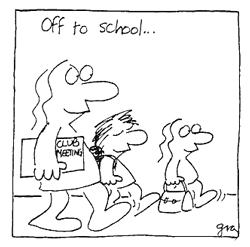Why have meetings?
When people act together as a group they will make decisions together. Meetings are necessary to ensure that all involved have an opportunity to share their knowledge and express views, and also to ensure that actions are well coordinated and effective.
 Meetings are important
Meetings are important
To a large extent the quality of its meetings will have an important shaping influence on a Parent Club’s overall effectiveness. If meetings are well-run, interesting and generally encourage participation they can be a source of energy for a group. Those attending are likely to want to return and to encourage others to get involved. By contrast, meetings which are boring, wasteful of time and which fail to involve all of those present are a drain on the energies of a group and ultimately threaten its existence.
How to run a good meeting
There is something of an art to running good meetings. It involves good judgement on the part of the chairperson who must balance sometimes competing needs. To a great extent the work of the chairperson (usually the president) will be much easier if the group develops an awareness of what is needed to enable all to participate effectively.
People should expect some order and understanding of the basic rules of formal meetings. However, these rules should not limit discussion and participation of all those attending. The ‘hidden agenda’ of all meetings should be building up strength and co-operation amongst members!
Different meetings have different purposes and require different structures and meeting techniques to make them work.
Managing meetings
Here are a variety of techniques to help you plan and manage your meetings better. There is no magic formula or agenda for every meeting so pick and choose the techniques that suit your purposes.
| What makes a good meeting | Action |
| There should be a good roll-up of people | Encourage people to come through personal invitations, social media, reminder phone calls, help with transport etc. |
| Participants understand the purpose of the meeting. | Always distribute the Agenda in advance. At the start of the meeting make sure everyone is clear about what you are going to discuss, what you are going to plan, what you are going to decide on etc. If part of your meeting is about allowing parents to raise issues and have an open discussion, make that clear too. |
| There should be agreement about the process or the way you will go about achieving this purpose. | After making sure everyone is clear about what you are there for, outline or get agreement on just how you are going to do it – i.e. how we will discuss, plan, decide etc. |
| There should be a sense of involvement and empowerment among participants. | You have to work out ways to make people feel that the decisions are their decisions: that they are able to do what needs to be done. Sit in a circle rather than having someone out in front talking and the rest in rows of chairs; get everyone to contribute by going round and asking everyone for their opinions instead of relying on the vocal few. |
| There should be a high level of energy and enthusiasm. | Keep things rolling at a good pace; vary the format of the meeting so people don’t sit passively for long periods. |
| There should be a sense that it is a meeting of real people, not just of people playing roles. | Make people feel welcome; use first names; treat everyone equally – the quiet newcomer deserves just as much respect and attention as the guest speaker. Get as many people to talk and participate as possible. |
| There must be a good facilitator – usually the President. | Make sure that someone is responsible for keeping an open and balanced conversational flow going; getting as many people as possible to speak; protecting individuals from personal attack etc. |
| Everyone should walk away knowing who has agreed to do what. | In the course of the meeting, record in the minutes exactly who is responsible for what, how they will achieve it, and make sure that everyone understands and agrees to the task they have been assigned. |



